Soft prosthetic contact lenses are specialized lenses designed to improve the appearance of disfigured eyes and provide comfort to patients experiencing light sensitivity or double vision. These custom-made lenses offer a discreet and natural look, helping patients regain confidence and improve their quality of life.
Soft Prosthetic Contact Lenses
Restore Appearance and Comfort with Soft Prosthetic Contact Lenses


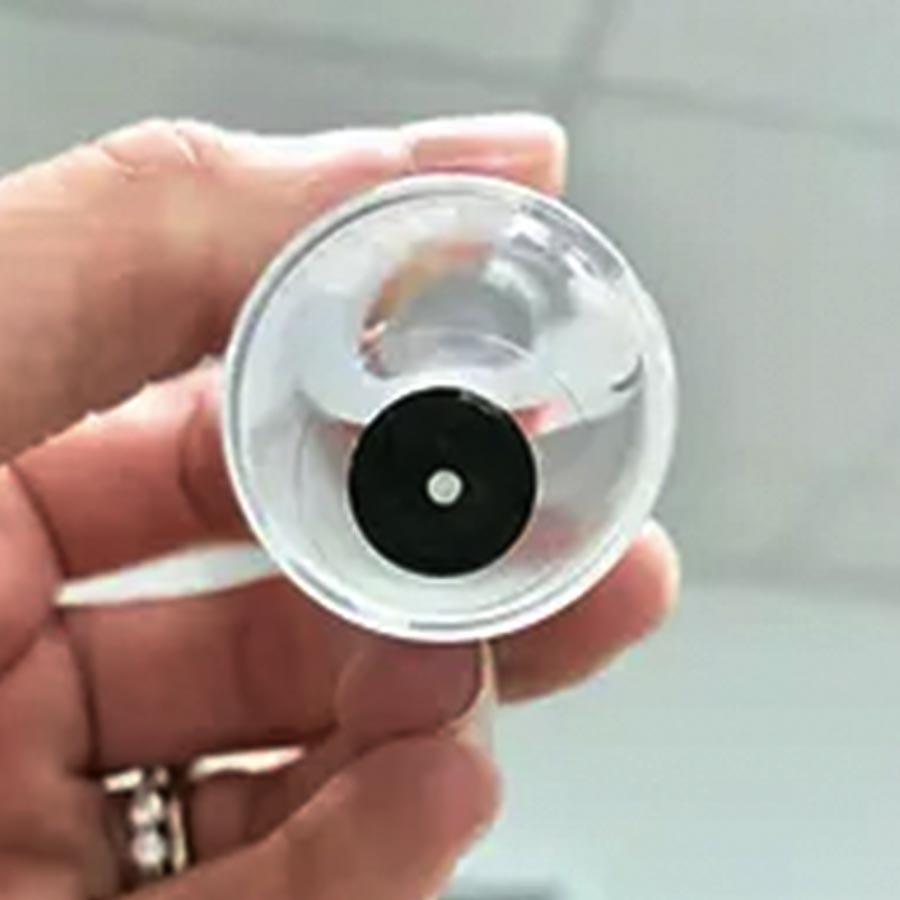
What Are Soft Prosthetic Contact Lenses
- Cosmetic Enhancement: Conceal scars, disfigurements, or congenital conditions to create a more natural appearance.
- Light Sensitivity Relief: Reduce glare and limit excessive light exposure for improved comfort.
- Improves Vision: Correct issues like double vision with specialized designs tailored to patient needs.
- Custom Design: Hand-painted lenses match your natural eye color for a seamless look.
How Soft Prosthetic Contact Lenses Work
The Process and What to Expect
Soft prosthetic contact lenses are meticulously crafted to match the appearance of the healthy eye. The process begins with a detailed consultation to understand your unique needs. These lenses can be simple solid colors or advanced, hand-painted designs that mimic your natural iris. Depending on your condition, the lens may reduce light sensitivity, cover corneal irregularities, or correct double vision. The fitting process ensures optimal comfort and stability on the eye.
Who Can Benefit from Soft Prosthetic Contact Lenses?
Is Soft Prosthetic Contact Lenses Right for You?
Soft prosthetic contact lenses are ideal for individuals with ocular disfigurement due to trauma, multiple surgeries, congenital conditions, or eye diseases that alter the eye’s appearance. They are also suitable for patients suffering from light sensitivity, irregular pupil shapes, or double vision. If standard corrective lenses have not provided relief, these custom lenses might be the right solution for you.
Achieving Results with Soft Prosthetic Contact Lenses
Experience Improved Appearance and Comfort
Patients using soft prosthetic contact lenses can expect a significant enhancement in the appearance of their eyes, often leading to boosted confidence and improved social interactions. The lenses are designed to closely match your natural eye, providing a subtle, natural look that blends seamlessly. Additionally, they offer functional benefits such as reducing light sensitivity and correcting visual disturbances, enhancing your overall quality of life.
Soft Prosthetic Contact Lenses
This patient wanted “brighter, whiter eyes” after having eye surgery that left her eyes looking bloodshot. She was interested in a more long-term solution than just using drops. She now wears large-diameter soft contact lenses that are tinted white to minimize the appearance of redness. She can wear these all day long, and they incorporate her prescription, so she does not need eyeglasses.

Who Can Benefit from Soft Prosthetic Contact Lenses?
This patient came to us on referral from a well-known glaucoma specialist. They were looking for a solution to their light sensitivity after multiple retinal and glaucoma surgeries left them with a pupil that was unable to constrict. We designed a hand-painted soft contact lens for them that has a black backing and a clear 4.5 mm diameter pupil in the center, greatly improving their light sensitivity issues.
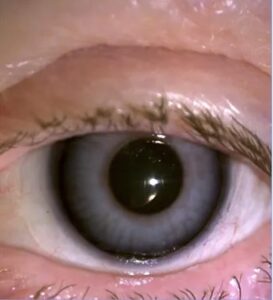
Achieving Results with Soft Prosthetic Contact Lenses
This patient came to us looking for a prosthetic lens with a natural look to cover their scarred eye. We also color-matched the natural color of their eye with this hand-painted soft contact lens, and we can hardly tell which is which!
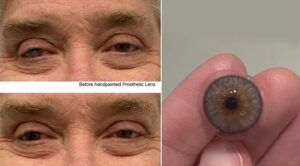
Soft Prosthetic Contact Lenses
We are so excited about this patient’s amazing transformation with a prosthetic scleral lens! He had tried colored prosthetics before but was interested in covering up some of the pigmentation that resulted from scarring on the white part of his eye as well. After going through the process we’ve found the right fit and color match and were able to create a white sclera around the color to cover the discoloration of the white part of the eye.
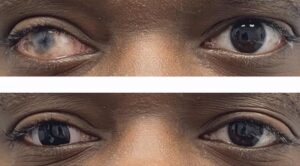
Soft Prosthetic Contact Lenses
Our patient is feeling confident with his new soft prosthetic contact lens. This lens was able to disguise the scarring in his right eye after complications from a childhood surgery. We are so happy with the results!
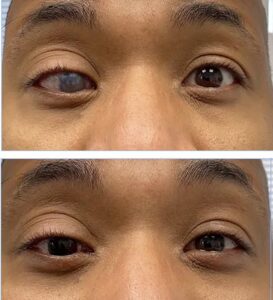
Achieving Results with Soft Prosthetic Contact Lenses
Here is a patient who suffered from extreme light sensitivity due to trauma to the eye. His pupil does not close anymore and remains open. We discussed all options including painted-colored contact lenses to match his eye color. Because his eyes are relatively dark in everyday lighting, he elected for a traditional custom black lens that would block out light and “re-create” a pupil for him.
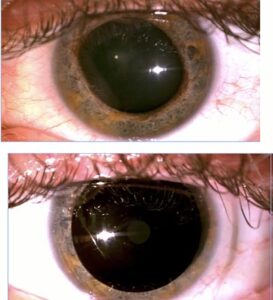
Soft Prosthetic Contact Lenses
Our patient suffered from double vision and balance issues after multiple surgical complications. We tried many different remedies, but the only way he found relief was to wear an eye patch over his eye. We designed an occlusion pupil custom prosthetic contact lens for him, which he wears to block vision in this eye. This looks better than his eyepatch!
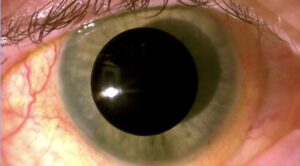
Soft Prosthetic Contact Lenses
Our patient wanted her eye to look “more normal” after multiple surgeries left her with an abnormally shaped pupil, and one eye that looked slightly smaller than the other. To design a custom prosthetic contact lens, we chose the brown color by taking photos and going into different environments to control for lighting differences. We took scans of the eye to determine the best sizing of the lens. We also took measurements to best match iris diameter and pupil size. Our patient is very happy with her appearance with the lens. This lens can last 1 year with proper care.
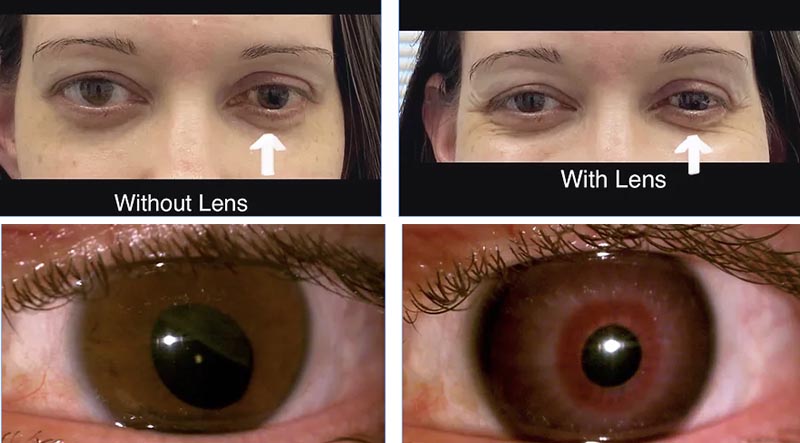
Achieving Results with Soft Prosthetic Contact Lenses
This patient suffered from double vision from myasthenia gravis. We tried multiple different glasses prescriptions with prism but the doubling fluctuated and was never consistent given the course of the condition. To alleviate this, we designed an occlusion pupil custom prosthetic contact lens for them which they wear to block vision in this eye. They now report their golf game is better than before and they can function once again!
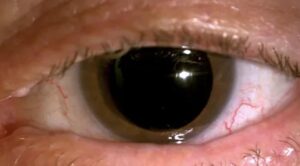
Soft Prosthetic Contact Lenses
This patient had many failed corneal transplants which resulted in them having an artificial cornea called a KPRO (keratoprosthesis). This is an extremely delicate eye. Because the artificial cornea has titanium plates, the eye appears blue. This patient ran a company and felt self conscious meeting with clients without his sunglasses because of the difference in appearance between his brown eye and his “blue-appearing” prosthetic eye.
We designed a simple brown prosthetic lens to be worn over their prosthetic cornea. The two eyes looked the same and the patient said it was the most life changing thing he has done in years due to his increase in confidence.
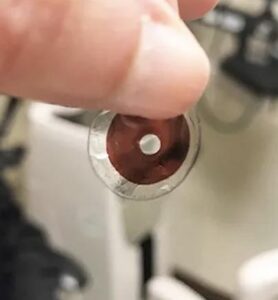
Soft Prosthetic Contact Lenses
This is our patient who had complications after cataract surgery that left their pupil irregular and pulled to one side. Because of this, they had extreme light sensitivity.
Even though this patient’s eyes were brown, when you are away from the eye it is so dark it looks almost black.
We are thankful for this because we were able to use a traditional custom black lens that would block out light and “re-create” the pupil. When looking at the patient from afar you cannot even see that they have this lens on. They are extremely happy and wear it all the time.
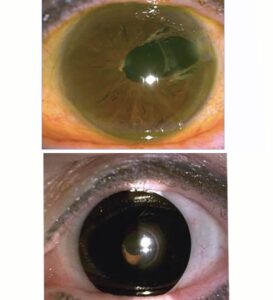
Achieving Results with Soft Prosthetic Contact Lenses
This patient presented with light sensitivity after an accidental trauma left them with iris tissue loss in the left eye. We designed a prosthetic soft contact lens to “recreate” the pupil. This improves their light sensitivity as well as their vision. They were able to see 20/20 with this eye after receiving this lens.
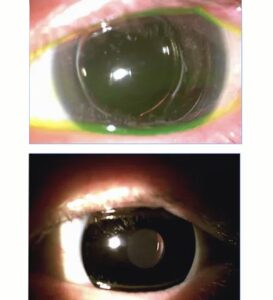
Soft Prosthetic Contact Lenses
This patient presented with an opacified cornea after trauma to the eye. They were looking for an option to make their damaged eye look more like their other eye. Here are the before and after. We fit them with a custom soft lens and then had that lens painted to the specifications of their eye. They were delighted with the results!
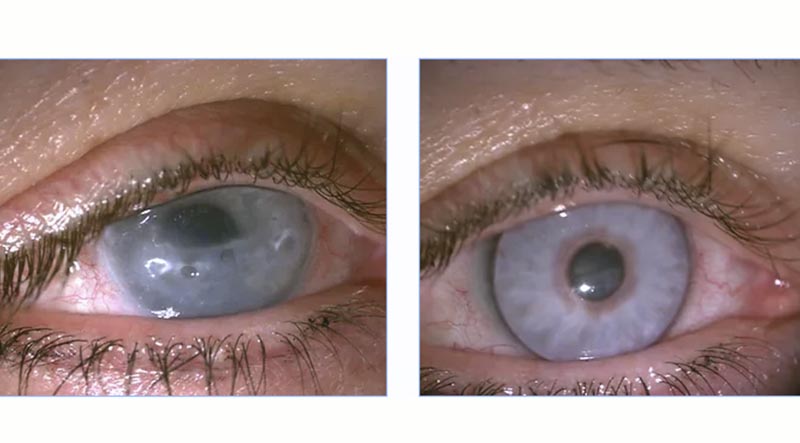
Soft Prosthetic Contact Lenses
This patient had a scarred right eye. They were wearing a prosthetic contact lens that had lots most of its color. We discussed all of their options with them and chose an option that made the lens very soft, comfortable, and had a “dipping” process to the dye that allowed for a lens that lasted a long time. Their right eye turns out so it still looks turned. There are some lenses that can be made where the paint can be de-centered but this patient chose to have a more simple lens that is easily replicable.
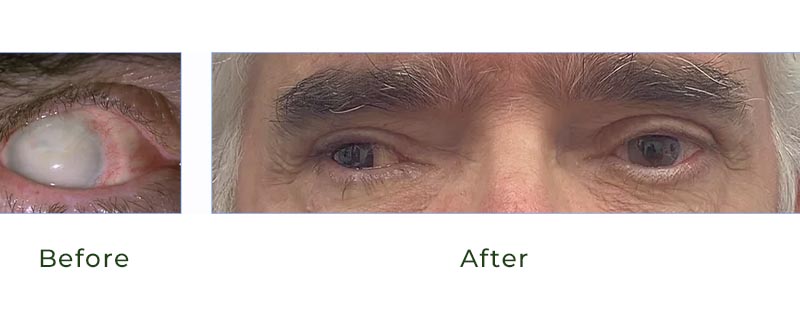
Frequently Asked Questions
What are soft prosthetic contact lenses used for?
Soft prosthetic contact lenses are used to improve the appearance of disfigured or damaged eyes due to trauma, surgeries, congenital conditions, or diseases. They also provide relief from symptoms such as light sensitivity and double vision, offering both cosmetic and functional benefits.
How do soft prosthetic contact lenses work?
These lenses are custom-made to match the appearance of your natural eye, using techniques like tinting and hand-painting to create a realistic look. They can also be designed to control light exposure, simulate a natural pupil, or cover irregular corneal shapes to improve vision and comfort.
Who is a good candidate for soft prosthetic contact lenses?
Candidates include individuals with ocular disfigurements, light sensitivity, double vision, or those who have experienced trauma, surgery, or congenital eye conditions. Patients seeking a natural cosmetic enhancement of a damaged eye are ideal candidates for these lenses.
How are soft prosthetic contact lenses different from regular contact lenses?
Unlike regular contact lenses, soft prosthetic lenses are custom-designed to address specific cosmetic and medical needs. They are crafted to match the natural color, shape, and appearance of your eyes while also addressing functional issues like light sensitivity and double vision.
How long do soft prosthetic contact lenses last, and how should they be cared for?
The lifespan of soft prosthetic contact lenses depends on the material and usage but generally ranges from a few months to a year. Proper care involves cleaning, disinfecting, and storing them correctly as instructed by your eye care provider to maintain their quality and effectiveness.

